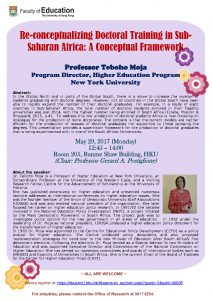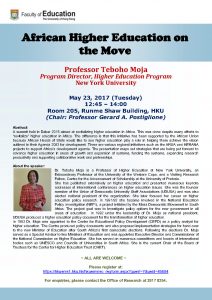China’s Universities and the Belt and Road
Speaker: Professor Gerard Postiglione
Date: Friday March 3, 2017
Date and Time: June 19, 2017 5:30pm EDT
Venue: National Committee on U.S.-China Relations, New York, NY
Abstract
As China has become a global power, it has sought to build an exportable educational model that will influence international education, while at the same time supporting the interests of the Communist Party. China has simultaneously in some ways strengthened its commitment to the Western university model and embraced its emphasis on the liberal arts and sciences as a way to drive innovation and economic progress. Chinese universities serve multiple constituencies: Chinese who will work in China upon graduation; Chinese who will seek employment outside of China, particularly in Belt and Road countries; non-Chinese who may hope to stay in China to work; and non-Chinese who will leave China upon graduation. How will the universities address these competing demands? They will draw on indigenous ideas in ways that are attractive both domestically and beyond its borders. Professor Gerard Postiglione of the University of Hong Kong has been observing this effort play out in the context of China’s push to become an international leader in the Belt and Road era. On June 19, Dr. Postiglione will join the National Committee for a conversation about higher education in Hong Kong and on the mainland, as well as the implications of China’s campaign to become a global leader in higher education.
Speaker’s Bio
Gerard A. Postiglione is Chair Professor in Higher Education in the University of Hong Kong, where he was associate dean for research and director of the Wah Ching Center of Research on Chinese Education. He received the Humanities and Social Science Prestigious Fellowship Award from the Hong Kong Special Administrative Region Research Grants Council in 2014. He received a Lifetime Contribution Award for studies in higher education by the Comparative and International Education Society (CIES) in 2015. He was inducted as a Fellow of the American Educational Research Association in 2016. His autobiography was published in Leaders in the Sociology of Education in 2016. He received a second Best Book Award from the CIES in 2017. Routledge press will publish a collection of his research works in July 2017. His other book in press is entitled The Changing Academic Profession in Hong Kong.
Registration: https://www.ncuscr.org/user/login?destination=node/4644/register

Reconceptualizing Doctoral Training in Sub-Saharan Africa: A Conceptual Framework
Date: May 29, 2017 (Monday)
Time: 12:45-14:00
Venue: Room 205, Runme Shaw Building, HKU
Speaker: Professor Teboho Moja
Chair: Professor Gerard A. Postiglione
Abstract: In the Global North and in parts of the Global South, there is a move to increase the number of students graduating with doctoral degrees. However, not all countries in the Global South have been able to rapidly expand the number of their doctoral graduates. For example, in a study of eight countries in Sub-Saharan Africa, the total number of doctoral students enrolled in their flagship universities was just 2614, with the highest number being enrolled in South Africa (Cloete, Mouton & Sheppard, 2015, p.4). To address this low production of doctoral students Africa is now focusing on strategies for the production of more doctorates. The problem is that the current models are neither efficient for the production of masses of doctoral graduates nor supportive to those pursuing the degrees. This presentation provides a supervision framework for the production of doctoral graduates that is being experimented with in one of the South African Universities.

African Higher Education on the Move
Date: May 23, 2017 (Tuesday)
Time: 12:45-14:00
Venue: Room 205, Runme Shaw Building, HKU
Speaker: Professor Teboho Moja
Chair: Professor Gerard A. Postiglione
Abstract: A summit held in Dakar 2015 aimed at revitalizing higher education in Africa. This was done despite many efforts to “revitalize” higher education in Africa. The difference is that this initiative has been supported by the African Union because African Heads of State would like to see higher education play a role in helping them achieve the vision outlined in their Agenda 2063 for development. There are various regional initiatives such as the ARUA and HERANA projects to support Africa’s development agenda. The presentation maps out strategies that are being put forward to advance higher education in areas of growth and expansion of systems, funding the systems, expanding research productivity and supporting collaborative work and partnerships.
